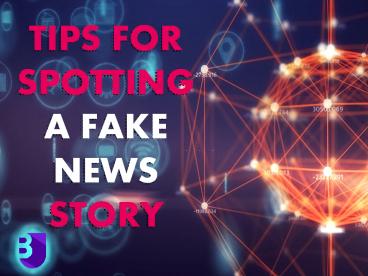Data Annotation Tools - PowerPoint PPT Presentation
Title:
Data Annotation Tools
Description:
: Unbiased Data Marketplace platform will act as a gateway to Data Annotations, knowledge sharing, collaborations & futuristic innovation. Learn More! – PowerPoint PPT presentation
Number of Views:644
Title: Data Annotation Tools
1
TIPS FOR SPOTTING A FAKE NEWS STORY
2
TIPS FOR SPOTTING A FAKE NEWS STORY
1. Vet the publishers credibility.
- Would the publishing site meet academic citation
standards? Just because a site is popular among
your friends does not mean its content is
accurate. - What is the domain name? Be wary of unusual
top-level domain names, like .com.co. A
second-level domain like abcnews may appear
credible. But note that abcnews.com.co is a
different and illegitimate site, though designed
to appear similar to the original. - Whats the publications point of view? Read the
About Us section for more insight into the
publisher, leadership, and mission statement.
Also, confirm that you have not stumbled upon a
satirical news site, like the Onion. - Who is the author? Has he or she published
anything else? Be suspicious if the byline, which
names the author, is a celebrity writing for a
little-known site or if the authors contact
information is a G-mail address
Visit-https//unbiased.cc/
3
TIPS FOR SPOTTING A FAKE NEWS STORY
2. Pay attention to quality and time
Do you notice splling erors sic, lots of ALL
CAPS, or dramatic punctuation?!?!?! If so, abort
your reading mission. Reputable sources have high
proofreading and grammatical standards. Is the
story current or recycled? Make sure an older
story isnt being taken out of context.
Visit-https//unbiased.cc/
4
TIPS FOR SPOTTING A FAKE NEWS STORY
3. Check the sources and citations.
- How did you find the article? If the content
showed up in your social media feed or was
promoted on a website known for clickbait,
proceed with caution. Even if the information was
shared by a friend, be sure to follow the steps
below to vet the publishers credibility. - Who is (or is not) quoted, and what do they
say? If you notice a glaring lack of quotes and
contributing sources, particularly on a complex
issue, then something is amiss. Credible
journalism is fed by fact-gathering, so a lack of
research likely means a lack of fact-based
information. - Is the information available on other sites? If
not, then its very likely that the journalistic
jury is still out on whether this information is
valid. Library databases are a great resources
for confirming the credibility of informationchec
k out Harvard Library's list of public resources. - Can you perform reverse searches for sources and
images? By checking cited sources, you can
confirm that the information has been accurately
applied and not altered to meet the authors
point of view. The same goes for images. In an
era of Photoshop magic, you cant always believe
what you see.
5
TIPS FOR SPOTTING A FAKE NEWS STORY
4. Ask the pros.
- Have you visited a fact-checking website? There
are many good ones, like Unbised.cc
FactCheck.org, International Fact-Checking
Network (IFCN), PolitiFact.com, or Snopes.com. Do
your own detective work and feel more confident
in being able to identify fact vs. fiction.
IF YOU EVEN DONT WANT TO DO THAT JUST GO TO
UNBIASED..CC
- Unbiased is fighting fake news and misinformation
using Blockchain and AI technology. - Specialized in Fighting Fake News with Blockchain
and Solve Fake News Problems
Visit-https//unbiased.cc/































